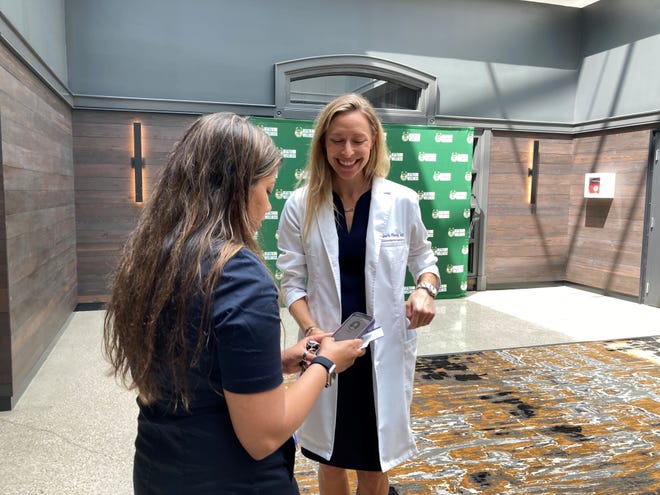The Milwaukee Bucks are launching a free weight-loss program aimed at combating obesity and preventing related illnesses such as diabetes and heart disease among underserved communities, the team announced Thursday.
The effort, funded by the Milwaukee Bucks Foundation, launched earlier this year and aims to enroll as many as 1,000 patients by the end of the year, said Dr. Elizabeth Sharp, a New York-based physician and wife of Bucks co-owner Wes Edens, who is spearheading the effort.
“There hasn’t been enough emphasis on diet and lifestyle factors, which can have a big impact not just on weight but on prevention,” Sharp said. New York-based medical practice “We feel that by treating the root cause of many weight-related symptoms, we can really make a positive and significant impact,” says Dr.
Sharp said more than 100 people have enrolled in the 12-month program, called the Bucks Health and Wellness Program, which offers weight-loss medication, personalized meal plans, exercise programs and regular follow-up visits with health care providers.
A Shorewood man has lost 26 pounds since joining the program.
One participant, Sydney Williams of Shorewood, has lost about 26 pounds since starting the program in February and is 12 pounds away from his goal weight of 210. He’s been taking the weight-loss drug Zepbound during the program, but he attributes his progress in large part to the meal and training plan he’s been following.
“You don’t just get a shot and it works,” he said of the weight-loss drug administered by injection. “It takes effort.”
Williams especially likes the personal attention he’s received.
If there’s something about the meal plan he doesn’t like, he sends a message to a nutritionist in New York. He knows the staff by name at the program’s clinic in Schlitz Park, the business park in downtown Milwaukee where the Bucks have their offices. He meets regularly with doctors and nurses to discuss improvements and goals.
“They really are with you the whole time you’re in this program,” Williams said. “I feel like I’m a part of something. I don’t feel like I’m just a number.”
The goal of the program is to help people lose weight and keep it off after they stop taking weight-loss medications in order to prevent chronic diseases such as diabetes, high blood pressure and high cholesterol.
About two in five Wisconsin adults are obese. Findings from researchers at the University of Wisconsin-MadisonObesity rates are even higher in some parts of the state, with more than half of adults north of Milwaukee reported to be obese. UW-Madison Research.
Monitor your weight, body fat and other metrics with regular check-ins
Throughout the 12-month program, participants check in regularly to record changes in weight, body fat percentage and muscle mass. They also undergo strength assessments and blood tests to check cholesterol and blood sugar levels.
“We have an app that has a very intimate program and we communicate with patients between appointments, and we track their progress with the meal plan so they can track not only their diet but their exercise as well to make sure they’re meeting their short-term and long-term goals,” Sharp said. “We actually track and monitor all biometrics, and studies have shown that doing so improves success in long-term weight maintenance.”
The exercise program is a self-supervised program accessed virtually through a mobile app and is designed to help participants maintain or gain muscle mass while losing body fat, according to Troy Flanagan, Bucks vice president of performance. The exercises can be done at home with minimal or no equipment, Flanagan said.
When asked why Bucks decided to set up its own obesity program rather than relying on existing health care providers in the city, Sharp said they wanted to maintain a degree of independence and autonomy.
“This gives us the flexibility to partner with any company, without being tied to a specific partner,” she said.
Sharp said the program works with the city’s community health centers and Froedtert Health to spread the word about obesity prevention programs.
She hopes to continue growing the program in the future.
“We’re focusing on obesity and want to expand our outreach and have a broader reach within the Milwaukee community,” she said.
The free program is open to adults who have a BMI of 30 or above, do not have diabetes and meet certain income criteria. Interested parties can visit buckshealthandwellness.com or email [email protected] with any questions.
Sharp said participants will have access to the nutrition and exercise elements of the program for an additional year after the initial 12-month period.


